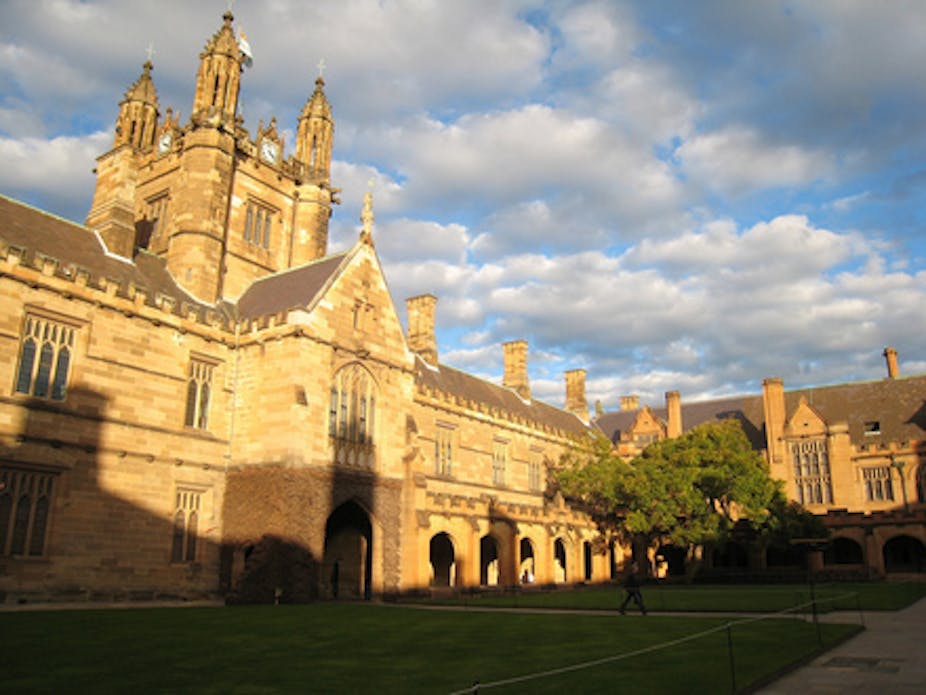Foundation Essay – Universities are still often known as ivory towers, other-worldly spaces of solitude where privileged elites known as academics seek refuge from the harsh realities of the world.
Although pejorative, the ivory tower image, originally Biblical, still manages to charm and seduce. Think of the majestic sandstone quadrangle of the University of Sydney.
Stroll through the ocean-side, eucalyptus-dotted campus of the University of California at San Diego. Spend a few peaceful hours in the frescoed medieval library of Bologna’s oldest university.
Surely these are places of rest and reflection? Spaces of personal self-discovery, refuges from hum-drum necessity, ultimately sites for the disinterested pursuit of universal knowledge?
They are not. During my lifetime, the ivory tower has been destroyed by a combination of forces. It has become a multi-purpose multiversity: an apparatus of government; a profit-seeking market corporation; a self-administering bureaucracy; a public space of scientific inquiry and debate about the public good.
Look at the trends. Universities are becoming government agencies. Boxed in by quality assessment exercises, financial inspections and state funding with strings, they are no longer places (as Kant put it) where only scholars pass judgement on scholars.
A government audit culture spreads: in the name of quality, everything seems subject to external political controls. Even research bodies are forced to conform to governments’ national objectives.
But universities are pulled in the opposite direction, by competitive market pressures. Gone forever are the days (as the old joke had it) when academics were voted into chairs only at the age they’d forgotten the meaning of the word ‘irrelevant’. Higher education is big business, or the tool of business.
The university is expected to balance its books, or even to make a surplus. Its press officers work overtime to market their ‘brand’ of higher education on the global market.
Students are fee-paying customers. Research designed to yield technology transfers and patents (‘patents, not papers’) is prioritised. In such fields as informatics and biotechnology, top-down support is given to start-up enterprises capable of commercially exploiting stocks of knowledge. Academics market themselves as consultants. Teaching becomes a saleable commodity, packaged for students in bite-sized learning packs and easy-to-open handouts.
More than a few universities stake out still different pathways to the future. Some protect themselves against the contradictory forces of government and the market by reacting defensively.
They pinch and squeeze themselves into successive rounds of review and re-organisation, hoping that their own experiments in self-regulation using the latest techniques of the new public management will ramp up their fiscal strength and administrative efficiency.
Internal re-organisations often produce great internal misery: endless meetings, mountains of email, peer group assessments, in general the loss of professional freedoms.
In response, some institutions of higher education seek regeneration through civic engagement with wider publics, including powerless groups who find it otherwise impossible to find their voice under democratic conditions.
What is especially interesting about this public service vision of the university is its creative response to those futilitarians and pessimists who bemoan its destruction by the combined forces of government, market and self-administration.
The forces of cynicism and listlessness should not be underestimated; many academics undoubtedly feel that paradise has been lost, that higher education, despite its unprecedented resources and growth, is directionless, no longer capable of bringing reason and knowledge to the world.
The trouble with the dysphoria is that it ignores the positive effects of the disappearance of the ivory tower.
Flung into a cyclotron of conflicting aspirations and outcomes, the university is forced to ditch its old metaphysical arrogance, of the kind satirised in the well-known story about the group of Englishwomen roaming the countryside recruiting soldiers at the outbreak of the First World War.
Sweeping into Oxford, they confronted a don in his Oxonian master’s gown, reading Thucydides in the original Greek. ‘And what are you doing to save Western civilisation, young man?’, one of the women demanded. Drawing himself up to his full height, the don looked down his nose, and replied: ‘Madam, I am Western civilisation!’
Thanks to what some see as its ruination, the university abandons such arrogance. Faced with a surfeit of data and different ways of seeing and doing things, higher education becomes a force for humility, an open space for publicly handling conflicting perceptions of ‘reality’.
The university befriends hyper-complexity. It mobilises suspicion of Truth. It stimulates awareness that our lives can be interpreted in multiple and different ways. It triggers the intelligent search for making public sense of a dynamic and highly complex world.
When universities function well, they champion the search for commercially viable knowledge and organise resistance to commercialism. They support government initiatives and cultivate suspicion of government ideologies and injustices.
Universities deal with the powerful and speak in defence of the weak. They give voice to the ironies of the human condition. They champion the public ethos of pluralism, lending it institutional force, so potentially placing the university on a collision course with ignorance, confusion, lies and nonsense - and all the other material forces of the 21st-century that threaten its multiple commitments to the public good.
This Foundation Essay is part of a series of articles to mark the launch of The Conversation. Others in the series are:
Better connecting the university to the public debate By Glyn Davis
When the science is so clear, why is the argument so clouded? By Ross Garnaut
A better formula for science communication By Peter Doherty
What’s the point of universities? It’s the ideas, stupid By Patrick McCaughey
The science of reporting climate change By Brian McNair
The modern university must reinvent itself to survive By Simon Marginson

